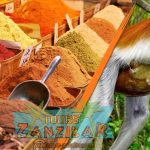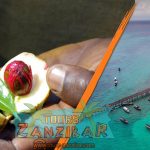Welcome to Tours-Zanzibar.com, your ultimate guide to unlocking the secrets of Zanzibar’s unique heritage. As a company dedicated to promoting cultural understanding, we invite you on a captivating journey through Zanzibar, where centuries-old traditions are interwoven with influences from various cultures to create a truly remarkable tapestry. This article explores the vibrant crossroads of cultures that have shaped Zanzibar, unearthing its rich history, traditions, and way of life. Join us as we delve into the heart of this enchanting destination, providing you with a comprehensive understanding of Zanzibar’s captivating heritage like never before. Open your mind, immerse yourself in diversity, and embark on a cultural exploration of Zanzibar with Tours-Zanzibar.com.
Table of Contents
- Zanzibar’s Cultural Melting Pot: A Journey into History and Heritage
- Exploring Zanzibar’s Architectural Marvels: A Blend of East and West
- Discovering the Rich Culinary Traditions of Zanzibar: Spice it Up!
- Preserving Zanzibar’s Intangible Cultural Heritage: Music, Dance, and Festivals
- Unraveling the Swahili Language: A Linguistic Treasure of Zanzibar
- Ways to Support Sustainable Tourism and Community Development in Zanzibar
- Immersing in Zanzibar’s Cultural Experiences: Museums, Markets, and Local Interactions
- Q&A
- The Way Forward

Zanzibar’s Cultural Melting Pot: A Journey into History and Heritage
The Rich Cultural Blend of Zanzibar
Zanzibar, often called the “Spice Island,” is a testament to the remarkable fusion of diverse cultures and traditions. Located off the east coast of Tanzania, this enchanting archipelago boasts a captivating history deeply intertwined with the Arab, Persian, Indian, and African influences that have shaped its identity over the centuries. At Tours-Zanzibar.com, we are dedicated to providing an immersive experience that takes you on a remarkable journey into the heart of Zanzibar’s unique heritage.
Discovering the essence of Zanzibar means exploring its historical landmarks, vibrant markets, and exquisite cuisine. As you wander through the narrow winding alleys of Stone Town, a UNESCO World Heritage Site, you will be transported back in time. Admire the beautifully preserved Swahili architecture with intricately carved wooden doors and balconies. Delve into the local markets where the aromatic spices, colorful textiles, and exquisite handcrafted goods will tantalize your senses. Experience the warm hospitality of the locals as you engage in conversations that offer insights into the island’s rich tapestry of customs and traditions.

Exploring Zanzibar’s Architectural Marvels: A Blend of East and West
The Architectural Gems of Zanzibar: A Blend of East and West
Zanzibar, an enchanting island off the coast of Tanzania, is not only known for its picturesque beaches and crystal-clear waters but also for its rich historical and architectural heritage. With influences from diverse cultures, including Arab, Persian, Indian, and European, the island boasts a unique fusion of architectural styles that reflects its historical significance as a cultural crossroads.
As you embark on our exclusive cultural tour offered by Tours-Zanzibar.com, you’ll have the opportunity to delve into the architectural marvels that dot the landscape of this captivating island. Each structure, from ancient forts to grand palaces, unfolds a story of Zanzibar’s past, showcasing the extraordinary blend of Eastern and Western elements.
You’ll be transported back in time as you step into the labyrinthine alleyways of Stone Town, Zanzibar’s historic district and a UNESCO World Heritage Site. Marvel at the intricately carved wooden doors adorned with brass spikes and accents inspired by Indian and Arab motifs. Listen to the echoes of history as you stroll through the narrow streets lined with coral stone buildings boasting balconies and verandas that showcase the influence of European architecture.
Unveiling the East-West Fusion
The fusion of architectural styles in Zanzibar didn’t happen by chance. Centuries ago, the island was a vital trading hub, attracting merchants from Asia, the Middle East, and Europe. Over time, Zanzibar became a melting pot of cultures, creating a captivating blend of architectural influences.
Explore ornate mosques, where delicate minarets reach towards the sky, showcasing elegant Islamic designs. Discover vibrant Hindu temples adorned with colorful sculptures and vibrant frescoes, reflecting the spiritual traditions brought by the Indian community. Marvel at the grandeur of British-built buildings, with their characteristic colonnades and Victorian-era charm.
By immersing yourself in Zanzibar’s architectural heritage, you’ll gain a deeper understanding of the island’s unique identity and the cultural crossroads that have shaped it over the centuries. Join us at Tours-Zanzibar.com as we unlock Zanzibar’s hidden gems and guide you on an unforgettable journey through time and culture.
Discovering the Rich Culinary Traditions of Zanzibar: Spice it Up!
About Zanzibar’s Culinary Traditions
Zanzibar, an enchanting island nestled off the coast of Tanzania, is a melting pot of diverse cultures that have shaped its rich heritage. In addition to its pristine beaches and magnificent landscapes, Zanzibar is renowned for its unique culinary traditions, infused with a compelling blend of flavors from Africa, Arabia, India, and Europe. From aromatic spices to exotic fruits and seafood delicacies, the local cuisine showcases various influences that delight the senses.
Delve into Zanzibar’s Spice Route
One of the highlights of any visit to Zanzibar is exploring its legendary Spice Route. Known as the “Spice Island,” Zanzibar boasts an abundance of aromatic spices that have lured traders from far and wide throughout history. Embark on a spice tour with Tours-Zanzibar.com and discover firsthand the secrets behind the island’s compelling spice trade. Engage your senses as you witness the cultivation of cloves, nutmeg, cinnamon, and black pepper, among others, and gain insights into their historical and cultural significance.
An Exquisite Gastronomic Adventure
Beyond the Spice Route, Zanzibar offers a captivating culinary journey that leaves food enthusiasts craving more. Join the expert guides of Tours-Zanzibar.com as they introduce you to traditional recipes passed down through generations. Immerse yourself in the lively atmosphere of vibrant food markets, where you can sample an array of delectable street food and interact with friendly locals. Learn how to create authentic Zanzibari dishes through hands-on cooking classes, where you’ll master the art of blending spices and balancing flavors to create mouthwatering delicacies.
Embark on a gastronomic adventure with Tours-Zanzibar.com and uncover the untold stories behind Zanzibar’s unique culinary heritage. From exploring iconic spice plantations to savoring exquisite dishes bursting with flavors, this experience will surely spice up your visit to this enchanting island.
Preserving Zanzibar’s Intangible Cultural Heritage: Music, Dance, and Festivals
Welcome to Tours-Zanzibar.com, where we invite you to explore the captivating and vibrant world of Zanzibar’s intangible cultural heritage. Immerse yourself in the rich music, mesmerizing dance, and colorful festivals that make Zanzibar unique. Discover the magic at the crossroads of history, tradition, and diversity.
Music: The Rhythm of Zanzibar
Prepare to be enchanted by the musical sounds that fill the air in Zanzibar. Music is at the heart of this culturally diverse island, blending Swahili and Arabic influences with East African rhythms. From soulful taarab music, haunting melodies, and poetic lyrics to the electrifying beats of kidumbak, Zanzibar’s music echoes the island’s history and tells stories of love, spirituality, and resilience.
Key highlights:
- Experience live performances by talented local musicians
- Learn traditional musical instruments such as the oud and qanun
- Engage in interactive workshops to master the art of Swahili drumming
Dance: An Expression of Zanzibar’s Soul
Let the rhythm of Zanzibar guide your feet as you delve into the world of traditional dance. Every step celebrates the island’s identity, whether the graceful Balla dance or the energetic ngoma. Feel the spirit of unity as dancers of different ages and backgrounds come together to perform with passion, precision, and joy.
Key highlights:
- Join in on dance workshops and learn the intricate moves of Zanzibar’s traditional dances
- Witness mesmerizing performances showcasing the diversity of dance styles
- Engage with local communities as they pass down dance traditions through generations
Festivals: Celebrating Zanzibar’s Cultural Kaleidoscope
Zanzibar is a land of festivities, where every corner of the island comes alive with vibrant colors, captivating rhythms, and a contagious sense of joy. Explore the kaleidoscope of festivals throughout the year, including the famous Zanzibar International Film Festival (ZIFF), Mwaka Kogwa, and the Jazz Festival. These celebrations offer a unique opportunity to witness the fusion of different cultural influences and traditions in a harmonious spectacle.
Key highlights:
- Participate in traditional rituals and ceremonies during festive events
- Experience the vibrant street parades filled with music, dance, and elaborate costumes
- Savor the flavors of Zanzibar’s culinary delights during festival feasts
At Tours-Zanzibar.com, we are committed to preserving and promoting Zanzibar’s intangible cultural heritage. Join us on a captivating journey that will leave you with a deep appreciation for the music, dance, and festivals that define this extraordinary island.
Unraveling the Swahili Language: A Linguistic Treasure of Zanzibar
Zanzibar, known for its pristine beaches and exotic spice markets, is also home to a linguistic gem – the Swahili language. As a linguistic treasure, Swahili reflects the rich cultural heritage of Zanzibar and the diverse influences that have shaped this unique island.
History and Origins
Swahili, often called Kiswahili by the locals, is a Bantu language originating from the East African coast. It developed through centuries of trade and interaction between Arabs, Persians, Indians, and indigenous African tribes. The fusion of Arabic, Persian, and Bantu languages gave birth to Swahili, which boasts a vocabulary influenced by over 1ten different languages.
Today, Swahili is not just a language but a cultural symbol representing the history and unity of the people of Zanzibar. It is the national language of Tanzania and Kenya and is widely spoken as a lingua franca in East Africa. With its rhythmic sounds and melodious intonation, Swahili has even caught the attention of linguists worldwide.
Key Features
Like many Bantu languages, Swahili has a rich system of noun classes, with 18 different classes that determine concord in grammar. This characteristic makes Swahili an intriguing language to study, as it requires a deep understanding of the intricacies within the noun class system. Additionally, Swahili has a unique sound system featuring click sounds reminiscent of Southern African languages.
Another fascinating aspect of Swahili is its loanwords. Over the centuries, Swahili has borrowed words from Arabic, English, French, and other languages, resulting in a vibrant vocabulary that bridges cultures. This characteristic reflects Zanzibar’s history as a melting pot of different cultures and is a testament to the island’s cross-cultural heritage.
Preserving Swahili
Tours-Zanzibar.com provides a unique opportunity to explore the Swahili language and its cultural significance firsthand. Our experienced guides will take you on a journey through the bustling streets of Stone Town, where Swahili can be heard in its purest form as locals go about their daily lives.
Whether you are interested in vocabulary, grammar, or the history behind Swahili, our tours offer a comprehensive experience that helps you unravel the linguistic treasure of Zanzibar. By preserving and celebrating the Swahili language, we contribute to preserving Zanzibar’s unique cultural heritage for generations.
| Why Choose Tours-Zanzibar.com? | What Our Tours Offer |
|---|---|
|
|
Ways to Support Sustainable Tourism and Community Development in Zanzibar
Preserving Zanzibar’s Rich Heritage
With its vibrant culture and stunning natural beauty, Zanzibar is a destination like no other. As travelers, it is our responsibility to support sustainable tourism and community development to preserve this island paradise’s unique heritage. At Tours-Zanzibar.com, we are committed to promoting responsible travel and helping you make a positive impact during your visit.
Engage with Local Communities
One of the best is by actively engaging with local communities. Please take the opportunity to meet and interact with the locals, learning about their way of life, traditions, and customs. By shopping at local markets, dining in local restaurants, and staying in community-run accommodations, you directly contribute to the local economy and help create income-generating opportunities for the residents.
Supporting Cultural Preservation Projects
Zanzibar is renowned for its rich cultural heritage, including architecture, music, dance, and arts and crafts. Supporting cultural preservation projects, you help protect and promote these unique aspects of Zanzibar’s identity. Consider attending traditional music and dance performances, visiting heritage sites, and purchasing authentic local handicrafts, all of which contribute to preserving the island’s cultural heritage.
Partnering with Responsible Tour Operators
When planning your trip to Zanzibar, choosing a tour operator that values sustainable tourism practices is essential. Tours-Zanzibar.com is committed to minimizing negative environmental and social impacts while maximizing the positive benefits of tourism. We work closely with local communities, employing local guides and drivers who share their deep knowledge and respect for the island’s heritage. By choosing us as your tour operator, you contribute to sustainable tourism while ensuring an enriching and authentic experience in Zanzibar.
Conclusion
Zanzibar’s unique heritage is a treasure worth preserving for future generations. By engaging with local communities, supporting cultural preservation projects, and choosing responsible tour operators like Tours-Zanzibar.com, you can make a meaningful difference during your visit. Let’s join hands in promoting sustainable tourism and community development to ensure that Zanzibar’s cultural crossroads continue to thrive for years to come.
Immersing in Zanzibar’s Cultural Experiences: Museums, Markets, and Local Interactions
Museums
When you visit Zanzibar, immersing yourself in the local culture is a must. One way to do this is by exploring the island’s various museums. Start your cultural journey by visiting the Zanzibar Museum, where you can delve into this vibrant destination’s rich history and heritage. Learn about the island’s spice trade and its influence on Swahili civilization, and discover artifacts that tell the story of Zanzibar’s unique past.
Markets
No visit to Zanzibar would be complete without experiencing the bustling markets that line the streets. Stroll through Stone Town’s market district and let your senses come alive with the vibrant colors, sounds, and aromas. Engage in friendly haggling with local vendors as you browse through various spices, textiles, and handmade crafts. Immerse yourself in the local lifestyle, tasting exotic fruits and snacks, and discover the true essence of Zanzibar’s cultural heritage.
Local Interactions
Engaging with the friendly locals is an essential part of your journey to truly understand the heart and soul of Zanzibar. Embark on a guided tour that introduces you to the local community, allowing you to interact and connect with the people who call this island home. Whether participating in a traditional Swahili cooking class, learning the art of traditional music and dance, or engaging in insightful conversations with locals, these interactions will give you a deeper appreciation and understanding of Zanzibar’s unique heritage.
Q&A
Q: What is Zanzibar’s unique heritage?
A: Zanzibar’s unique heritage blends diverse cultures, including Arabic, African, Indian, and European influences.
Q: Where is Zanzibar located?
A: Zanzibar is an archipelago located off the coast of Tanzania in East Africa.
Q: How did Zanzibar become a cultural crossroads?
A: Zanzibar’s location along major Indian Ocean trade routes made it a strategic trading post, attracting merchants and traders across Africa, Asia, and the Middle East.
Q: What are the major religions in Zanzibar?
A: The major religions in Zanzibar are Islam, Christianity, and Hinduism.
Q: How has religion influenced the culture of Zanzibar?
A: Religion has played a significant role in shaping the culture of Zanzibar, with each faith contributing to the diverse traditions, rituals, and beliefs of the island.
Q: What is the impact of colonization on Zanzibar’s heritage?
A: The island has a long history of colonization, with the Portuguese, Omani Arabs, and British all leaving their mark on the culture, language, and architecture of Zanzibar.
Q: What are some must-visit cultural sites in Zanzibar?
A: Some must-visit cultural sites in Zanzibar include Stone Town, a UNESCO World Heritage Site, the Palace Museum, and the Old Fort.
Q: How can visitors best experience Zanzibar’s unique heritage?
A: To fully experience Zanzibar’s unique heritage, visitors are encouraged to explore the island’s markets, try local cuisine, and participate in cultural events and festivals.
Q: Are there any cultural norms or customs visitors should know in Zanzibar?
A: Visitors should respect local customs and dress modestly, particularly when visiting mosques or other religious sites. It is also essential to greet people appropriately, “Jambo” or “Salam Aleikum.”
Q: What makes Zanzibar’s heritage stand out from other cultural destinations?
A: Zanzibar’s heritage is unique due to the diverse blend of cultures that have influenced and shaped the island’s identity, making it a melting pot of traditions, languages, and customs.
The Way Forward
In conclusion, Zanzibar is a remarkable destination that offers a variety of cultural experiences for visitors. Its unique heritage, shaped by centuries of trade and colonization, sets it apart from other tourist destinations. As we have discovered, the island’s diverse population and rich history have influenced its cuisine, architecture, and way of life. By understanding and appreciating Zanzibar’s cultural crossroads, we can better understand our global community and the importance of preserving unique cultural traditions. Whether you are interested in history or cuisine or simply looking for a picturesque destination, Zanzibar has something to offer everyone. So come and immerse yourself in Zanzibar’s vibrant culture and magnificent beauty, and leave with a newfound appreciation for this fascinating island.














